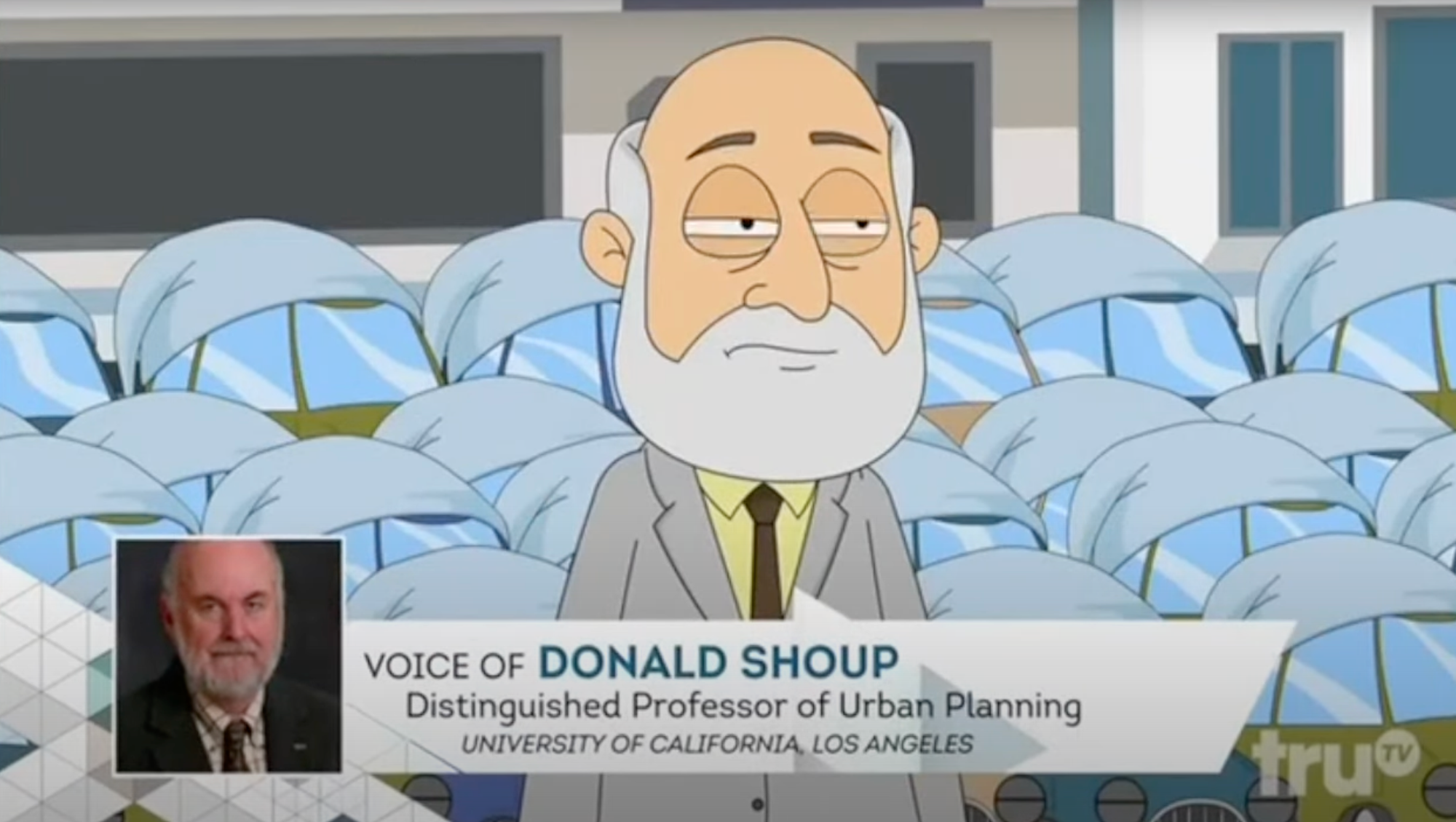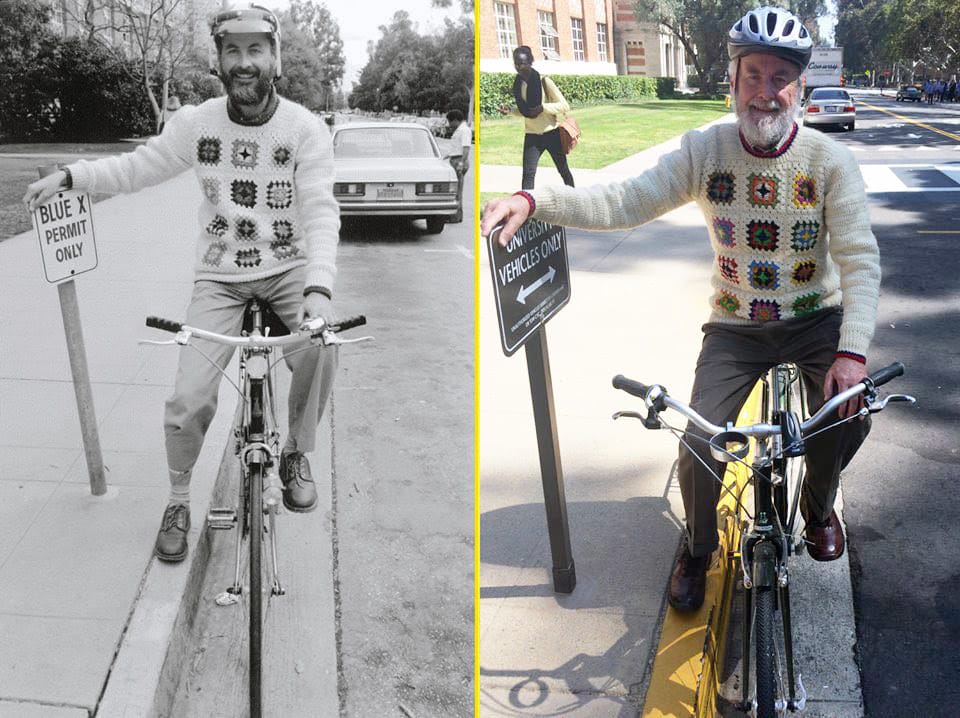Feed the meter
The fact that LA could even aspire to host a "car-free" games owes a great debt to Donald Shoup repeating, for decades, that just because you're going somewhere in this city, you're not automatically guaranteed a free parking spot when you get there

In 2005, a 750-page book written by a UCLA professor blew a crater-sized hole in the urban-planning discourse. In a society where plentiful parking supposedly equaled business, Donald Shoup's The High Cost of Free Parking offered a radical counterpoint: free parking was, in fact, decimating our asphalt-slathered cities, and we were all paying the price. For the next 20 years, Shoup's dogged spirit, acerbic wit, and infinite generosity built a parking reform movement that gave way to real policy changes. And his message only seemed to grow more resonant over time. Here's Shoup in 2023: "There is no free curb parking in a crowded city, only a choice about who should pay for it — curb parkers or everyone, even people who can’t afford a car."
Shoup died last week at the age of 86, but you'll see him everywhere in LA over the coming years. His legacy looms large over the transportation strategies for LA's megaevents; his thinking informs the plans to eliminate parking at venues. He was passionate about developing integrated ticketing systems where spectators can bundle a seat at a stadium with a prepaid transit trip. The fact that LA could even aspire to host a "car-free" games owes a great debt to Donald Shoup repeating, for decades, that just because you're going somewhere in this city, you're not automatically guaranteed a free parking spot when you get there.
This video featuring Shoup is among my favorite things Vox produced while I was there
Shoup was not an urban planner by training, but an economist who fervently believed that pricing could change behavior. His central thesis — charge appropriately for the convenience of driving and invest the money back into improving better transportation options for everyone — is basic demand management. But to Shoup, making drivers pay the fair market value for the social and environmental impacts of parking also leveled the playing field for people who didn't or couldn't drive — and who always end up paying in other ways. He was obsessed with this idea of fairness, epitomized by one of his most famous quotes: "It's unfair to have cities where parking is free for cars and housing is expensive for people." His work firmly positioned him at the nexus of both urban land-use crises, making him a hero twice over.
The High Cost of Free Parking, with its iconic Monopoly-board cover, brought Shoup a level of fame unrivaled in the urbanist world. Acolytes who dubbed themselves "Shoupistas" nicknamed him "Shoup Dogg," a term of endearment he enthusiastically embraced. Spotting him biking to campus from his home nearby in Westwood was better than a celebrity sighting. A 2018 CityLab story declared that Shoup had made parking "sexy." When I was asked to appear on an episode of Adam Conover's show Adam Ruins Everything talking about the U.S.'s traffic fatality crisis, I asked if the episode would be named "Adam Ruins Cars." No, it couldn't, the producers said, because they already did that episode, which featured an animated Shoup narrating the indecency of the American parking lot. Shoup's name became synonymous with the ills of U.S. car-centrism.

As Shoup's recommendations gained a global following, evangelists organized on the ground to implement his policy ideas. Shoup was a founding advisory board member of the Parking Reform Network, an international nonprofit that has pushed cities and states to eliminate parking requirements for new buildings and implement dynamic pricing for on-street spots. If policymakers show skepticism, says the network's president Tony Jordan, simply giving them copies of Shoup's book can often be a radicalizing action in itself: "Just reading the title can be provocative." Over the weekend, Jordan created a memorial page for Shoup, where members from around the world are pledging renewed energy to push his agenda forward. "This was his life’s work," Jordan says. "I think he would want us dedicating state bills to him."
If it sometimes felt like Shoup was the only parking expert — somewhat true; many academics considered such a populist topic to be below them — it's because Shoup treated his legions of fans not as followers, but as co-conspirators. "It would be an exaggeration to say that all this reform begins with Don. But it wouldn’t be a huge one," writes Michael Manville, now chair of UCLA's urban planning department, in a 2022 essay. "Don has shown that when we give people knowledge, they will use it, and the world will, in small steps, get better."
And he did most of this after the traditional retirement age. In a delightful remembrance by Henry Grabar, whose 2023 book Paved Paradise: How Parking Explains the World dives deep into Shoup's legacy, Grabar reminds us that Shoup's manifesto was published when he was 67. "Since I first came upon Don’s scholarship in book form, I initially underestimated his importance as a teacher," Grabar writes. "He worked at UCLA for more than half a century!" Shoup officially "retired" in 2015, but you'd never know it; he continued to teach his wildly popular parking policy class, mentor students, and appear at transportation events. The last time I saw him was at UCLA's Lake Arrowhead Symposium in October, where he was easily the most-cited attendee. And he was still writing; there's a new book of "Shoup doctrine" essays that will now be published posthumously, a possibility he wryly joked about. As he told Grabar: "The best part is that I’ve had the rare opportunity to edit 30 eulogies before I go."

In recent years, Shoup's quest to solve LA's broken sidewalk conundrum brought him a new wave of admirers. But as Madeline Brozen, a former Shoup student who is now deputy director of UCLA's Lewis Center for Regional Policy Studies, pointed out to me, protecting sidewalks was always part of Shoup's mission. In 2006, Shoup teamed up with Michael Dukakis, who was teaching at UCLA, to wage a war on "apron parking" — when drivers deposit their vehicles in the non-space at the end of the driveway, blocking the sidewalk. Shoup assailed LA's councilmembers on behalf of indignant pedestrians, arguing — successfully — that the city's lax enforcement was a violation of the Americans with Disabilities Act. Brozen says this was Shoup's typical approach with elected officials. "He would just birddog the crap out of them," she says. "He was relentless about getting people's attention."
For a city that needs to both upgrade its infrastructure and bring in more revenue — all megaevents aside — Shoup has already written the playbook. Brozen posted a lovely thread of the big ideas Shoup proposed over the years, many still unrealized as LA policy. In most cases, these are simple solutions that just need political will, says Brozen. "He would always see things in terms of problems that we could fix — if we just cared about them." 🔥
📍For those who aren't in LA, the Parking Reform Network's plan is to hold satellite gatherings. You can become a member or stay tuned on social media for more details
📖 I highly recommend Don's book, as well as Henry's book — Henry was my very first Torched Talks! But if you're looking for a quick primer, I often give parking-curious people this War on Cars interview as a way to ease into Don's ideas





